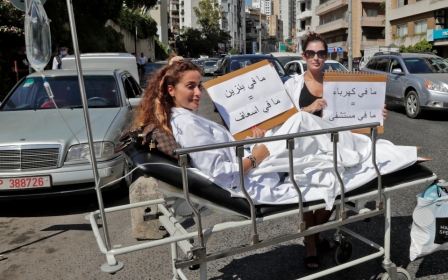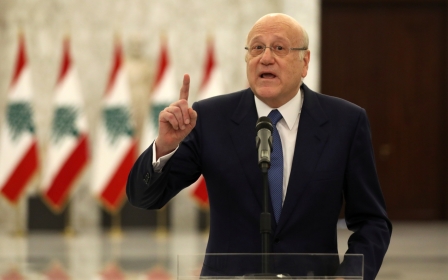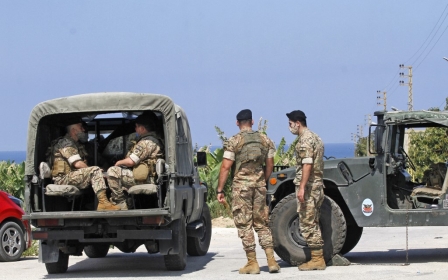Lebanon: First Iranian fuel shipment arrives from Syria, says Hezbollah
Hezbollah said it had received its first delivery of Iranian fuel via Syria on Thursday, as Lebanon continues to grapple with crippling fuel shortages.
Sources from the Iran-backed movement told Middle East Eye on Thursday that 80 trucks carrying 50 tonnes of diesel oil each will cross into Lebanon in the next 24 hours.
The oil trucks will use the illegal crossing of al-Shawaghir, located in the Lebanese village of Hosh el Sayed Ali, to transport the oil from Syria, they added.
Hezbollah MP Hassan Fadlallah called the project a "humanitarian initiative... to ease the Lebanese people’s suffering, which has increased due to the US blockade on external monetary transfers as well as foreign aid from entering the country."
"This initiative is a process that will be prolonged as long as the country continues to be in need," he told MEE.
New MEE newsletter: Jerusalem Dispatch
Sign up to get the latest insights and analysis on Israel-Palestine, alongside Turkey Unpacked and other MEE newsletters
Opponents of the move said the Iranian oil risks exposing Lebanon to US sanctions.
Early on Thursday, the Iranian-backed group's al-Manar TV said a convoy of at least 20 tanker trucks carrying Iranian fuel had already entered Lebanon from Syria.
Images posted online by al-Manar showed the fuel tankers entering Lebanon as Hezbollah officials carrying flags and banners waited to celebrate the trucks' arrival.
Lebanon is facing a crippling economic crisis, with shortages in petrol, bread and medicine spreading chaos across the country.
Earlier on Monday, Hezbollah leader Hassan Nasrallah said that an Iranian fuel ship had docked in the Syrian port of Baniyas on Sunday.
"It is expected that the transport of the fuel will begin on Thursday," Nasrallah said during a television address on Monday.
"[Hezbollah] is not looking to make a business out of this but wants to help ease the people's hardships."
He added that the fuel would be carried overland to the Baalbek region, in Lebanon's eastern Bekaa valley, where it would be stored before its distribution.
Distributed 'below cost'
Nasrallah said that the Iranian fuel would be distributed free of charge to institutions, including state hospitals, nursing homes, orphanages and the Red Cross.
The rest, he added, would be sold "below cost" to bakeries, private hospitals or companies that run private generators.
TankerTrackers.com tweeted visual confirmation on Tuesday of an Iranian tanker, identified as the Faxon, discharging gasoil in Baniyas.
The online oil shipment tracking service said the vessel was discharging 33,000 metric tonnes of fuel, which would require 1,310 truckloads to deliver it by land to Lebanon.
Last month, Nasrallah announced that a shipload of fuel for Lebanon would depart from Iran in defiance of US sanctions.
Iraqi oil
Lebanon is grappling with a financial crisis branded by the World Bank as one of the world's worst since the 1850s.
The Lebanese pound has lost more than 90 percent of its value since late 2019, leaving four out of five inhabitants below the poverty line.
The crisis deepened when the central bank started removing subsidies to shore up its dwindling foreign currency reserves, making the cost of fuel imports more expensive and leading to wide-ranging shortages, with power cuts lasting up to 22 hours a day and fuel for private generators increasingly scarce.
In July, Iraq signed an agreement to provide the Lebanese government with one million tonnes of heavy fuel oil a year in return for goods and services. Lebanon's caretaker energy minister, Raymond Ghajar, said that the fuel could generate enough electricity for four months.
*AFP and Reuters contributed to this report
Middle East Eye delivers independent and unrivalled coverage and analysis of the Middle East, North Africa and beyond. To learn more about republishing this content and the associated fees, please fill out this form. More about MEE can be found here.




